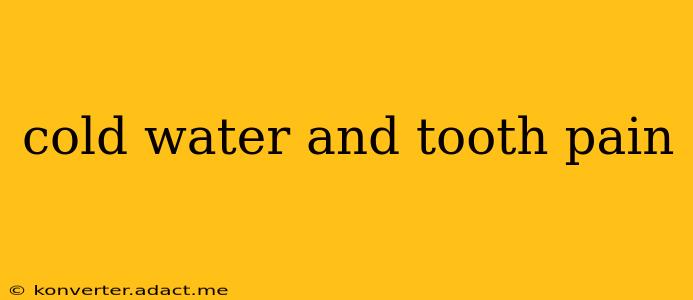Experiencing a sharp, shooting pain in your teeth when you drink cold water? You're not alone. This common dental issue can stem from a variety of causes, ranging from minor sensitivities to more serious underlying problems. Understanding the reasons behind this sensitivity is the first step towards finding effective relief. This comprehensive guide will explore the connection between cold water and tooth pain, examining potential causes, effective home remedies, and when to seek professional dental care.
Why Does Cold Water Cause Tooth Pain?
The most common culprit behind cold-water sensitivity is dentin hypersensitivity. Dentin is the layer of tissue beneath the enamel, your tooth's protective outer layer. When the enamel wears down or is damaged, the dentin's microscopic tubules become exposed. These tubules contain nerve fibers that react to temperature changes, causing a sharp, short-lived pain when exposed to cold stimuli like ice water, ice cream, or even cold air.
Several factors contribute to enamel erosion and dentin exposure:
- Aggressive Brushing: Brushing too hard or using a hard-bristled toothbrush can wear away enamel over time.
- Acidic Foods and Drinks: Frequent consumption of acidic beverages (soda, juice) and foods can erode enamel, leaving dentin exposed.
- Teeth Grinding (Bruxism): This unconscious habit wears down enamel, particularly on the biting surfaces of the teeth.
- Gum Recession: As gums recede, they expose more of the root surface, which is primarily dentin and highly sensitive.
- Dental Procedures: Certain dental procedures, like teeth whitening or fillings, can sometimes cause temporary or long-term sensitivity.
- Cavities: Decay weakens tooth structure, making teeth more vulnerable to temperature changes and leading to pain.
- Cracked Teeth: A crack or chip in a tooth can expose the dentin and cause sensitivity to cold.
What Other Symptoms Might I Experience?
While cold sensitivity is a key indicator, other symptoms might accompany tooth pain triggered by cold water, depending on the underlying cause:
- Pain with Hot Drinks: Sensitivity to both hot and cold can indicate a more severe problem.
- Lingering Pain: If the pain persists long after the cold stimulus is removed, it warrants immediate dental attention.
- Swelling or Inflammation: These are signs of infection or other serious dental issues.
- Sharp, Shooting Pains: Typically associated with exposed dentin.
- Dull, Aching Pain: Could indicate a more serious underlying condition like an abscess.
How Can I Treat Cold Water Sensitivity at Home?
For mild sensitivity, several home remedies can provide relief:
- Desensitizing Toothpaste: These pastes contain ingredients like potassium nitrate or strontium chloride that help block the tubules in dentin, reducing sensitivity.
- Fluoride Mouthwash: Fluoride strengthens enamel and can help protect against further erosion.
- Avoid Acidic Foods and Drinks: Minimize consumption of acidic beverages and foods.
- Gentle Brushing: Use a soft-bristled toothbrush and brush gently.
- Avoid Abrasive Toothpastes: Choose pastes specifically designed for sensitive teeth.
When Should I See a Dentist About Cold Water Sensitivity?
While home remedies can alleviate mild sensitivity, you should schedule an appointment with your dentist if:
- Pain is Severe or Persistent: If the pain is intense or lasts for an extended period, it's essential to seek professional help.
- Pain is Accompanied by Other Symptoms: Swelling, inflammation, or persistent aching require immediate dental evaluation.
- Home Remedies Aren't Effective: If home treatments don't alleviate the sensitivity, a dentist can diagnose the underlying cause and recommend appropriate treatment.
Can Cold Water Sensitivity Be Prevented?
Yes, taking proactive steps can minimize your risk of developing cold water sensitivity:
- Maintain Good Oral Hygiene: Brush twice daily with a fluoride toothpaste and floss daily.
- Use a Soft-Bristled Toothbrush: Avoid harsh brushing techniques.
- Limit Acidic Foods and Drinks: If you do consume acidic beverages, rinse your mouth with water afterward.
- Regular Dental Checkups: Regular visits allow your dentist to detect and address any dental issues early.
This information is for general knowledge and does not constitute medical advice. Always consult with a qualified dental professional for diagnosis and treatment of any dental concerns.
